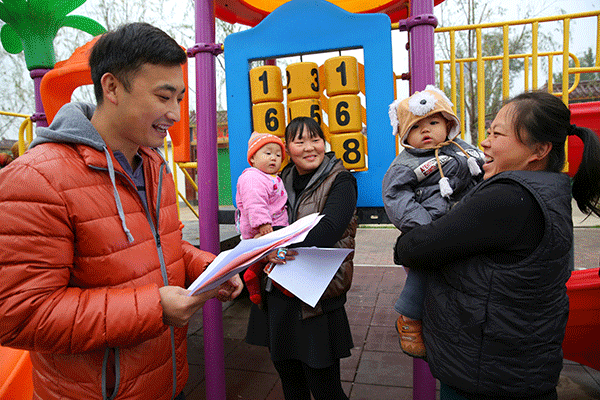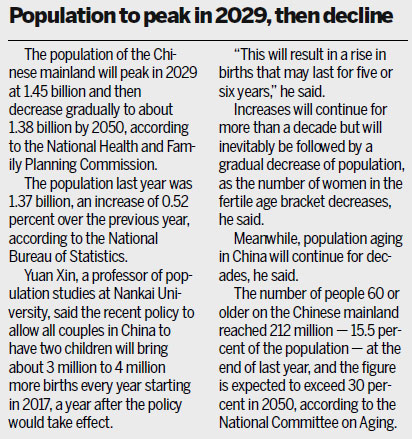90m more to be eligible for 2nd child
Updated: 2015-11-11 08:56
|
||||||||
 |
|
|
Half of those who qualify are over 40, so only a fraction are likely to get pregnant, official says
The number of women in China eligible to have a second child will jump by more than 90 million when the latest family planning policy is adopted, with half of the additional women falling between 40 and 49 years of age, according to China's top health authority.
Currently, there are about 140 million women in the fertile age bracket who already have one child. Fifty million of those are eligible to have a second child now, Wang Peian, vice-minister of the National Health and Family Planning Commission, said at a news conference on Tuesday. That means 90 million more women will be eligible to have a second child once restrictions are removed, he said.
"It is predicted that there will be a surge in new births in China over a short period, but the increase in the total population will not be large," Wang said.
Health and family planning workers will face new challenges, since about 45 million of the newly eligible women will be in their 40s. New measures will be needed to support older women in having a second child, Wang said.
The proposed change to universal eligibility was announced by China's top leadership last month. The policy must be approved by the National People's Congress, the national legislature, likely next year, Wang said.
Potentially, the change could add about 30 million people to the labor force by 2050, while blunting the impact of overall population aging, he said.
Under current policies, which were adopted early last year, only couples where at least one partner is an only child are allowed to have a second child in most urban areas.
Yuan Xin, a professor of population studies at Nankai University in Tianjin, said women between 40 and 49 years old who want a second child will face many challenges in giving birth
One obstacle is that many in that age group have used intrauterine devices as a means of contraception, he said.
"First of all, the health authorities should make sure such devices are safely removed," he said. "Otherwise it will be impossible for these women to conceive."
Also, he said, it should be understood that older women face greater health risks in pregnancy, such as hypertension.
Wang, of the family planning commission, said it is estimated that only 17 million of the 90 million newly eligible women will actually have a second child over the next five years, while the rest will either choose not to expand their families or will find it difficult or impossible to become pregnant, he said.
Yuan said more public services aimed at the newly eligible group are necessary.
"Hospitals should provide priority services to older women who are pregnant, so they don't have to wait in long lines," he said.
Zheng Mingbiao, a 37-year-old man with a 3-year-old daughter in Beijing, said he and his wife, who is the same age, may choose not to have another child even if they are eligible.
"It is very tiring to look after a baby, and there will be an extra economic burden," he said. "Besides, I am afraid my wife's health will be affected if she has another baby at this age."
wangxiaodong@chinadaily.com.cn


 French warplanes strike Islamic State Syria bastion
French warplanes strike Islamic State Syria bastion
 Xi, Putin meet at G20 summit, renewing pledges on cooperation
Xi, Putin meet at G20 summit, renewing pledges on cooperation
 Eiffel Tower goes dark as France mourns terrorist attack victims
Eiffel Tower goes dark as France mourns terrorist attack victims
 Victims of terrorist attacks in Paris commemorated worldwide
Victims of terrorist attacks in Paris commemorated worldwide
 Standing shoulder to shoulder with France
Standing shoulder to shoulder with France
 Paris shooting and explosions in photos
Paris shooting and explosions in photos
 Top 10 regions that led the shopping spree on Singles Day
Top 10 regions that led the shopping spree on Singles Day
 Traditional Yuju Opera faces dilemma
Traditional Yuju Opera faces dilemma
Most Viewed
Editor's Picks

|

|

|

|

|

|
Today's Top News
Chinese president arrives in Turkey for G20 summit
Islamic State claims responsibility for Paris attacks
Obama, Netanyahu at White House seek to mend US-Israel ties
China, not Canada, is top US trade partner
Tu first Chinese to win Nobel Prize in Medicine
Huntsman says Sino-US relationship needs common goals
Xi pledges $2 billion to help developing countries
Young people from US look forward to Xi's state visit: Survey
US Weekly

|

|





